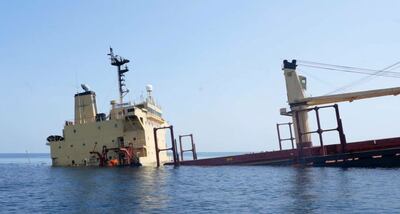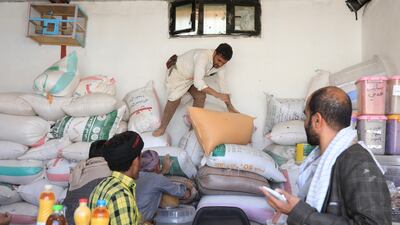Against the backdrop of a continuing failure to end the devastating war on Gaza, the crisis in the Red Sea is worsening. Months of Houthi attacks on international shipping have sunk their first ship – the UK-registered Rubymar – and on Monday, US Central Command said missiles fired by the rebels struck the MSC Sky II, a Liberian-flagged, Swiss-owned container vessel. Meanwhile, the Hong Kong telecoms company HGC Global Communications has said that four underwater communications cables in the Red Sea have been damaged, an incident that has had “a significant impact on communication networks in the Middle East”.
Much has been written about the risks to global trade posed by such attacks that, on the face of it, are being carried out by the Yemeni militants ostensibly to show their opposition to the US, Israel and their allies. Although many people in the region and further afield are frustrated – to put it mildly – at the international community’s apparent inability to end Gaza’s suffering, the Houthis’ tactics are endangering some of the region’s most vulnerable civilians, including their fellow Yemenis.

Last week, the International Rescue Committee said a decision by its carrier to suspend operations in the Red Sea had forced the charity – which has been supplying vital aid to civilians in war-torn Sudan – to “seek alternative routes, which are longer and more costly, for the delivery of essential pharmaceutical supplies which are critical for life saving health services”. The rising cost and physical risk of sending aid and supplies through the Red Sea have been highlighted by other humanitarians, too.
In January, 26 aid bodies signed a joint statement expressing “grave concern over the humanitarian impacts of the recent military escalation in Yemen and the Red Sea” adding that “escalation will only worsen the situation for vulnerable civilians and hinder the ability of aid organisations to deliver critical services”. A February report from the Food Security Cluster – which is jointly led by the UN’s Food and Agriculture Organisation, and World Food Programme – warned that continued disruption in the Red Sea “has the potential to reduce food imports to Yemeni Ports, increase the cost of imports because of higher insurance premiums and increase prices of basic food and non-food items, and reduce household purchasing power”.
While the risks posed to life-saving humanitarian aid are devastating, the Houthis’ sinking of the Rubymar, which was carrying thousands of tonnes of fertiliser when it went down, could pose a long-term threat to the region's marine life. The Middle East division of Greenpeace this week warned that the release of this much fertiliser could affect the pH balance of the seawater and cause a major algae bloom. That would produce a massive influx of nitrogen that would affect the Red Sea’s delicate ecosystem. Given the major international effort that went into averting another potential environmental disaster – that posed by the rusting FSO Safer oil tanker off the coast of Hodeidah – endangering yet more of Yemen’s ecosystem is a step backwards for the country.
In a UN Security Council report issued last week, the UN Special Envoy for Yemen, Hans Grunberg, pointed to the need for “the Yemeni parties to stop public provocations, refrain from military opportunism inside Yemen, and refocus on safeguarding the progress made to date in the peace talks”. It is this opportunism by the Houthis, who are exploiting the understandable anger over the situation in Palestine, that is damaging lives and livelihoods among some of the region’s most vulnerable people. Global trade can weather the storm of shocks such as shipping disruption in the Red Sea – people who depend on aid cannot.


